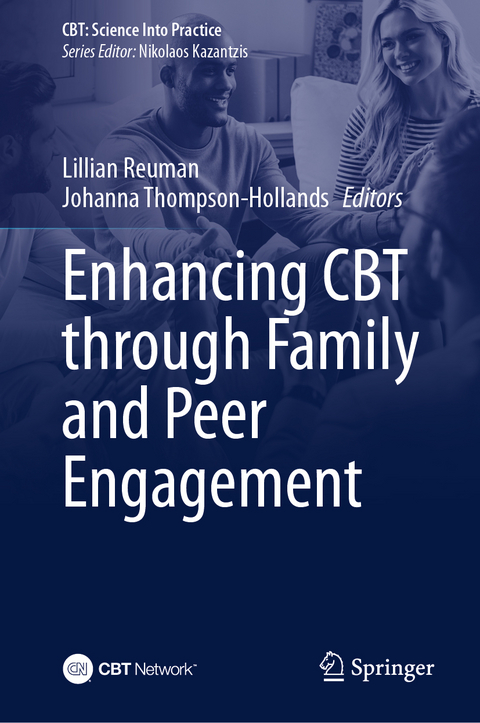
Enhancing CBT Through Family and Peer Engagement
Springer International Publishing (Verlag)
978-3-031-74837-0 (ISBN)
- Noch nicht erschienen - erscheint am 04.02.2025
- Versandkostenfrei
- Auch auf Rechnung
- Artikel merken
This edited volume brings together clinical and research experts to focus on the important roles that personal relationships play in terms of outcome. Each chapter includes practical guidance in this areas, a synthesis of recent empirical evidence, and the clinical considerations for diverse identities. This book emphasizes a transdiagnostic approach - in assessment and therapy, across levels of care - and how it can be implemented in a variety of settings including community mental health centers, inpatient hospital settings, and schools. Differing configurations of therapy are also discussed, such as whole family or parent/partner only formats. This text holds relevance for both clinical trainees and seasoned professionals alike.
From the foreword by Nikolaos Kazantzis:
"Family members and peers often play crucial roles, either supporting the individual within or outside sessions, and at other times may inadvertently reinforce symptoms, thus maintaining the disorder. Including these significant others in clinical assessment and treatment offers unique benefits and can augment or exceed the benefits of individual interventions."
"The practice of CBT ideally considers the individual in context, within family, peer, and partner relationships. As we move towards a science for CBT that clearly identifies those processes of etiology that become processes of treatment, strengthening interpersonal relationships, including directly drawing on the support of others in the client's life, can bolster the effects of CBT. The purpose of Dr. Reuman and Dr. Thompson-Hollands' book is to inspire clinicians and researchers to continue expanding family and peer involvement across settings and conditions. By embracing the synergistic power of CBT and interpersonal support, we can create a more holistic and effective therapeutic experience for those we serve. Dr. Reuman and Dr. Thompson-Hollands have performed exceptionally well in this regard."
Dr. Lillian Reuman is a licensed clinical psychologist. She is an Assistant Professor at Stonehill College in Easton, MA. Dr. Reuman’s clinical work and research is dedicated to understanding and treating transdiagnostic fear-based disorders. Her mixed methods clinical research aims to directly improve the lives of individuals living with anxiety and those who interact with them. Dr. Reuman has extensive clinical training in evidence-based treatments and has provided clinical care across a range of settings. She has conducted, presented, and published research in national and international venues. Dr. Reuman has co-authored over 50 peer-reviewed articles and chapters on cognitive behavioral processes and treatments. Dr. Johanna Thompson-Hollands is a licensed clinical psychologist. She is a staff investigator in the National Center for PTSD at the VA Boston Healthcare System and an Associate Professor of psychiatry at the Boston University Chobanian and Avedisian School of Medicine. Dr. Thompson-Hollands is an expert in the field of PTSD intervention; her research focuses on the role of social factors in treatment and how best to incorporate significant others into care to improve patient outcomes. She is the developer of a brief family intervention protocol that is meant to support patients as they undergo exposure-based treatment for posttraumatic stress disorder. She has published over 40 peer-reviewed articles and chapters and has received multiple grants for her work from the National Institute of Mental Health and the Department of Veterans Affairs.
Part I: Assessment.- Chapter 1: Multi-informant Adult and Couple Assessment.- Chapter 2: Child Assessment with Corroborative Parent Report.- Part II: Interventions with Adults.- Chapter 3: Weekly Outpatient Conjoint Treatment for Adult Psychopathology.- Chapter 4: Intensive Multi-couple Group Treatment.- Chapter 5: Family-only Adjunctive Treatment.- Chapter 6: Community-based Family-inclusive Treatment.- Chapter 7: Dyadic Treatment in the Context of Medical Concerns.- Part III: Interventions with Children and Adolescents.- Chapter 8: Parent Involvement in Weekly Outpatient Treatment.- Chapter 9: Parent-Only Treatment of Children and Adolescents.- Chapter 10: Technology Enabled Behavioral Parent Training.- Chapter 11: Family involvement in DBT for adolescents within a partial hospitalization program setting.- Part IV: Interventions with Peers.- Chapter 12: Peer-supported Treatment for Adults.- Chapter 13: Peer-Supported School-Based Treatment for Adolescents.
| Erscheint lt. Verlag | 4.2.2025 |
|---|---|
| Reihe/Serie | CBT: Science Into Practice |
| Zusatzinfo | XV, 322 p. 2 illus. |
| Verlagsort | Cham |
| Sprache | englisch |
| Maße | 155 x 235 mm |
| Themenwelt | Geisteswissenschaften ► Psychologie ► Klinische Psychologie |
| Medizin / Pharmazie ► Medizinische Fachgebiete ► Psychiatrie / Psychotherapie | |
| Schlagworte | CBT • Cognitive Behavioral Therapy • family engagement • interpersonal relationships in therapy • Peer Engagement • psychotherapy |
| ISBN-10 | 3-031-74837-9 / 3031748379 |
| ISBN-13 | 978-3-031-74837-0 / 9783031748370 |
| Zustand | Neuware |
| Haben Sie eine Frage zum Produkt? |
aus dem Bereich


